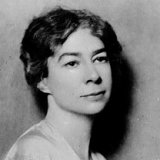Analysis of Swans
Sara Teasdale 1884 (St. Louis) – 1933 (New York City)
Night is over the park, and a few brave stars
Look on the lights that link it with chains of gold,
The lake bears up their reflection in broken bars
That seem too heavy for tremulous water to hold.
We watch the swans that sleep in a shadowy place,
And now and again one wakes and uplifts its head;
How still you are -- your gaze is on my face --
We watch the swans and never a word is said.
| Scheme | ABAB CDCD |
|---|---|
| Poetic Form | Traditional rhyme Quatrain |
| Metre | 11100100111 11011111111 011110100101 1111011001011 110111001001 01001110111 1111111111 11010100111 |
| Closest metre | Iambic hexameter |
| Characters | 395 |
| Words | 83 |
| Sentences | 3 |
| Stanzas | 2 |
| Stanza Lengths | 4, 4 |
| Lines Amount | 8 |
| Letters per line (avg) | 38 |
| Words per line (avg) | 10 |
| Letters per stanza (avg) | 150 |
| Words per stanza (avg) | 41 |
Font size:
Submitted on May 13, 2011
Modified on April 04, 2023
- 24 sec read
- 312 Views
Citation
Use the citation below to add this poem analysis to your bibliography:
Style:MLAChicagoAPA
"Swans" Poetry.com. STANDS4 LLC, 2024. Web. 1 May 2024. <https://www.poetry.com/poem-analysis/34566/swans>.


Discuss this Sara Teasdale poem analysis with the community:
Report Comment
We're doing our best to make sure our content is useful, accurate and safe.
If by any chance you spot an inappropriate comment while navigating through our website please use this form to let us know, and we'll take care of it shortly.
Attachment
You need to be logged in to favorite.
Log In